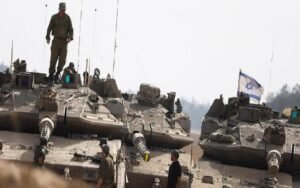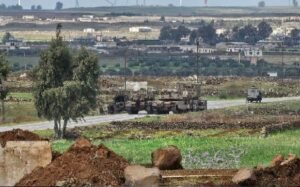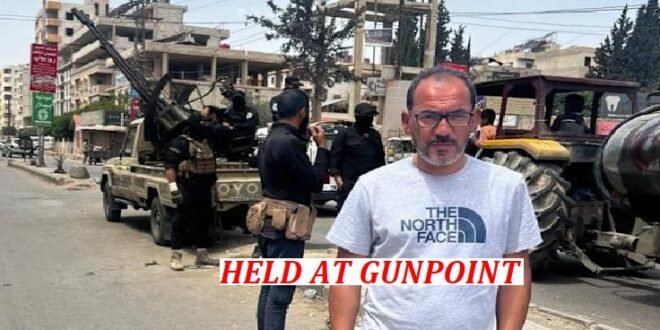06-06-2025
DAMASCUS/ DERAA: On the morning of 9 May, I was part of a BBC Arabic team which left the Syrian capital, Damascus, for the southern province of Deraa. From there we planned to go to the frontier with the Israeli-occupied Golan Heights.
We wanted to get close to the Syrian territory that has been seized by the Israeli military since December, when Israel’s prime minister said it was taking control indefinitely of a demilitarized buffer zone and neighboring areas following the fall of Bashar al-Assad’s regime.
 We were a team of seven, myself (a British citizen), two Iraqi BBC staff, and four Syrians, three freelancers and one BBC cameraman.
We were a team of seven, myself (a British citizen), two Iraqi BBC staff, and four Syrians, three freelancers and one BBC cameraman.
We were filming near one of the UN Disengagement Observer Force (UNDOF) observation posts, close to the town of al-Rafeed, when an official from the UN told us that the Israeli side had inquired about our identity and had been informed that we were a BBC crew.
We next drove north towards Quneitra city which has been located inside the buffer zone since a 1974 disengagement agreement between Syria and Israel which captured the Golan during the 1967 Middle East war.
About 200m (660ft) away from the city, an unguarded checkpoint blocked the road. To the side of the checkpoint we spotted Merkava tanks, one of which was flying an Israeli flag.
From a nearby tower, two Israeli soldiers were watching us, one of them through binoculars and my colleague held his BBC ID up for them to see.
The BBC has complained to the Israeli military about what happened next to my team but it has not yet received a response.
A minute after we started filming in the area, a white car approached from the other side of the checkpoint.
Four Israeli soldiers got out of the car and surrounded us. They pointed their rifles at our heads and ordered us to place the camera on the side of the road. I tried to explain that we were a BBC crew but things escalated unexpectedly quickly.
 I was able to send a message to my BBC colleagues in London saying that we had been stopped by the Israeli military before our phones and all equipment were confiscated, more Israeli soldiers arrived in a Humvee military vehicle, and our car was thoroughly searched.
I was able to send a message to my BBC colleagues in London saying that we had been stopped by the Israeli military before our phones and all equipment were confiscated, more Israeli soldiers arrived in a Humvee military vehicle, and our car was thoroughly searched.
The soldiers escorted us through a barrier into the city of Quneitra and stopped at the crossing point that separates Quneitra from the occupied Golan. There, the soldiers began reviewing the footage as we sat in our car, while one pointed his rifle at my head from metres away. After more than two hours, one of the soldiers asked me to step out of the car and speak on a mobile phone.
I didn’t know who the person on the line was. He spoke broken Arabic. He asked why we were filming Israeli military positions. I told him I was a British BBC journalist and explained to him the nature of our work. I returned to my car and the rifle was again aimed at my head.
After another hour of waiting, one more vehicle arrived. A group of security personnel got out of the car carrying blindfolds and plastic zip ties and asked me to step out first.
The lead officer, who spoke fluent Palestinian Arabic dialect, took me by the hand towards one of the rooms at the crossing point which were previously used by the Syrian army. The floor was strewn with broken glass and rubbish. He told me that they would treat me differently, no handcuffs, nor blindfold, unlike the rest of my team. (BBC)
 Pressmediaofindia
Pressmediaofindia




